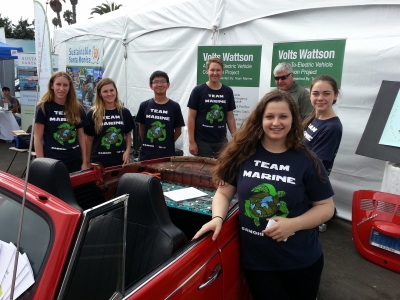A VW Conversion Fuels Young Minds
Joel Reynolds, the NRDC’s Western Director and Senior Attorney and a longtime ally of Heal the Bay, offers a guest blog post about the good work being done by Team Marine at Santa Monica High School.
One summer night in 1971 in Riverside, California, when I was still in high school, I learned to drive a stick shift in a Volkswagen beetle, fearlessly loaned to me for that purpose by one of my friends — undoubtedly without his parents’ permission.
Could I have converted that gas-powered car to electric? Not a chance. But even if I could, I never would have understood why that might be a good idea, much less why our collective fate might depend on it.
It’s a different world today. At least if you’re one of a group of dedicated and environmentally-savvy students called Team Marine at Santa Monica High School in Southern California.
Last month, after four years of work, they not only completed the conversion of a donated 1971 Volkswagen beetle from gas to all-electric, but when they turned it on, the car started up and it ran, as planned, just like the gas-powered car I had borrowed 42 years ago — but without the air pollution.
Under the direction of Santa Monica High School science teacher and team coach Benjamin Kay – a one-man force for environmental education if ever there was one – Team Marine received the donated VW in 2009 and then proceeded to raise money from a host of sponsors, acquire the parts, learn the technical knowledge required, and then convert the car by replacing its combustion engine and gas tank with an electric motor and 30-kilowatt hour lithium iron phosphate battery pack.
And that isn’t all. The team has also created an electric vehicle instruction manual, educational materials, and multi-media presentations that are designed to raise awareness about climate change, ocean acidification, energy conservation and carbon-reduction strategies. Over the next several months, the students will conduct local tests to showcase the VW’s anticipated 100+ mile range, maximum freeway speed, and zero to 60 mph time.
This is both an astonishing technical feat for a group of high school students and an extraordinary accomplishment in environmental education. But more than that, it is an act of environmental leadership from a generation of young students that, like it or not, are going to inherit the greatest environmental challenge the world has ever known – and have to solve it.
Climate change is a challenge of global proportions. But it is also an opportunity. In the words of the world-renowned whale scientist Dr. Roger Payne, “[t]he environmental crises we face provide us with the most singular opportunity for greatness ever offered to any generation, in any civilization.”
If one measure of society’s progress is environmental understanding and activism, the students of Team Marine are light-years ahead of where I was at their age. And that’s very good news for all of us.



